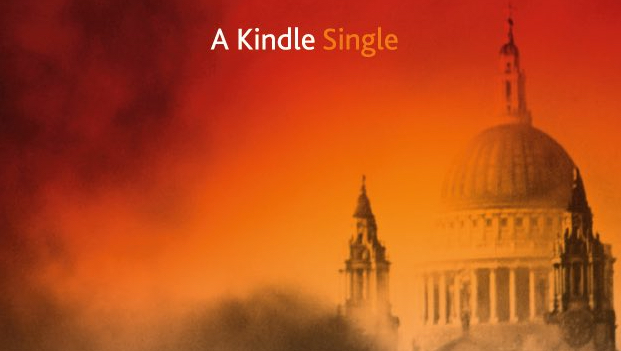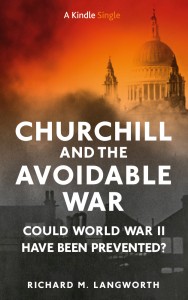
Churchill and the Avoidable War: Outline
A reader who enjoys my book, Churchill and the Avoidable War, suggests that it would appeal more broadly if people knew what was in it (like the Affordable Care Act). Ever anxious to reap the huge monetary rewards of a Kindle Single, I offer this brief outline. If this convinces you to invest in my little work of history (paperback $7.95, Kindle $2.99) thank-you. Kindly click here.
Chapter 1. Germany Arming, 1933-34

“Revisionists” claim Churchill was “for Hitler before he was against him.” To say he admired Hitler is true in one abstract sense: he admired the Führer’s political skill, his ability to dominate and to lead. With his innate optimism, he even hoped briefly that Hitler might “mellow.” In appraising Hitler, Churchill knew the truth well before most of his contemporaries.
Notable in this chapter is a pleading letter Hitler wrote to Churchill’s friend Harold Harmsworth, Lord Rothermere. If you ignore Hitler’s references to Aryan supremacy, one might almost think it was written by the Pope.
Strife with Britain was so avoidable, Hitler wrote All his life he has worked for peace and understanding between the two dominant white races. Germany and “England” had lost the flower of a generation in World War I, and for what?
Rothermere bought Hitler’s plaints—hook, line and sinker. He sent a copy to Churchill. Churchill’s reaction to it was couched in noble words of appreciation for the British democracy and Britain’s historic role of opposing continental tyrants. It was exactly what we would expect. It helps to show that in his broad understanding of Hitler, Churchill was right all along: dead right.
Chapter 2. Germany Armed, 1935-36
It is often said that Churchill supported Hitler because of a remark which, taken out of context, makes him sound like a fan: “One may dislike Hitler’s system and yet admire his patriotic achievement. If our country were defeated I hope we should find a champion as indomitable to restore our courage and lead us back to our place among the nations.”
This chapter provides Churchill’s surrounding words, which give a very different picture. The British statesman had only loathing for what Hitler’s policies led to. The chapter also examines Churchill’s famous and contentious essay, “Hitler and His Choice,” in the Strand Magazine, 1935, later reprinted in Great Contemporaries—and Churchill’s consistent warnings of the perils of disarmament in 1934-35.
Chapter 3. Rhineland: “Act to win,” 1936
Years later, Churchill wrote that Hitler could have been stopped when he marched into the Rhineland in 1936. On the evidence, this is true. The French army was overwhelmingly superior. Indeed Hitler had ordered his troops to turn around should they encounter French opposition. At the time, however, Churchill failed to press the issue. He met and encouraged French foreign minister Pierre Flandin, who came to London pleading for British support in a showdown with the Germans.
Prime Minister Stanley Baldwin turned Flandin down flat. He didn’t know much about the Germans, Baldwin declared, but he knew his own. And the British people did not want war. Hoping for office under Baldwin, who had become prime minister with a large majority just four months earlier, Churchill chose not to buck his leader. Knowing that France was under no such constraints, Churchill clung to a hope Flandin would return and encourage French action. But the Paris cabinet was divided, and would not move without British support. There are legitimate criticisms of Churchill’s inconsistency in this episode, which belong in the history of a missed chance.
Chapter 4. Derelict State: Anschluss, 1938
In March 1938, Hitler proclaimed an Anschluss, or union with Austria. Churchill did not see this coming, though he had warned of the probability. He was also wrong in believing that the majority of Austrians were against it. I quote reliable sources showing that they were behind it by large majorities.
Ironically, to quote Manfred Weidhorn’s review of Churchill and the Avoidable War, “the performance of the Wehrmacht in the Anschluss was out of a Viennese operetta.” Mechanical breakdowns were 30%. Officers and men arrived late and untrained. VII Army Corps described its motorized vehicle situation as nahezu katastrophal (almost catastrophic). I quote one account: “Like some great malfunctioning clockwork, the Wehrmacht lurched and shuddered towards the Austrian capital. Only a few parts of it finally grated to a halt in the suburbs of Vienna one week later.”
His generals reminded an infuriated Hitler that they had warned him Germany was not ready for a major conflict. Yet, as with the North Vietnamese Tet Offensive thirty years later, operational disaster did not equate to propaganda disaster. The Nazi propaganda machine successfully convinced the world that Germany had enjoyed a glorious success. British Intelligence must have had reports of the truth. Yet the facts seemed almost to be a state secret.
Chapter 5: Munich: Mortal Folly
The Munich agreement entrenched Hitler in power. It gave him the fat prize of Czechoslovakia with its outstanding armaments industry. In the invasion of France in 1940, three of the ten panzer divisions were Czech-built. It was a classic example of wishful thinking and fatal compromise.
Yet over Munich, a curious narrative has evolved: that the agreement was actually wise, since it gave the Allies another year to arm. Less often remarked is that it also gave Germany another year to arm. Even German sources agree the Nazis were less formidable in 1938 than they were in 1939-40. What was there about fighting them a year later that made this preferable?
Well, goes the argument, Britain and France could not have defended landlocked Czechoslovakia. This is a bit silly. “It surely did not take much thought,” Churchill wrote, “that the British Navy and the French Army could not be deployed on the Bohemian mountain front.” There were other avenues open: a blockade of Germany by the mobilized Royal Navy; French action in the Rhineland. This chapter also examines the credible 1938 plot to overthrow Hitler. After Munich the plotters despaired. Later most were executed.
Chapter 6. “Favourable Reference to the Devil”: Russia, 1938-39
Munich sealed Czechoslovakia’s fate. On 14 March 1939, Catholic fascists proclaimed an independent, pro-Nazi republic of Slovakia. The next day Ruthenia seceded, only to be occupied by Hitler’s ally Hungary. Summoned to Berlin, Czech President Emil Hácha agreed to German occupation of the rest of his country. It became the Protectorate of Bohemia and Moravia—an arrangement which “in its unctuous mendacity was remarkable even for the Nazis.”
Churchill and the Avoidable War herein examines Churchill’s evaluation of the Soviet danger versus the Nazi danger; his conclusion that the latter was the greater threat; his urgent efforts, particularly with Soviet Ambassador to Britain Ivan Maisky, to encourage an understanding with Stalin; and the rebuff his prescriptions received by the British (and to some extent the Soviet) government. Sadly, while Prime Minister Chamberlain was sending low-level diplomats to negotiate with Moscow, Hitler was sending his foreign minister. Thus the surprise announcement of the Nazi-Soviet non-aggression pact, which left Hitler free to attack Poland.
Chapter 7. Lost Best Hope: America, 1918-41
“America should have minded her own business and stayed out of the World War. If you hadn’t entered the war the Allies would have made peace with Germany in the Spring of 1917…. There would have been no collapse in Russia followed by Communism, no breakdown in Italy followed by Fascism, and Germany would not have signed the Versailles Treaty, which has enthroned Nazism in Germany. If America had stayed out of the war, all these ‘isms’ wouldn’t today be sweeping the continent of Europe….”
Google this alleged 1936 statement and you’ll find a half dozen citations ascribing it to Churchill. That’s a striking reversal of his off-stated view that America was indispensable to winning World War I. As World War II approached, these alleged words resurfaced. Churchill sued the perpetrator and won.
An opportunity to welcome American support of Britain and France arrived on 11 January 1938, when President Roosevelt sent Chamberlain a message offering to mediate an easement of tensions after consulting with the British government. A golden opportunity? Chamberlain rebuffed it. Privately he complained that the Americans “are incredibly slow and have missed innumerable busses….I do wish the Japs would beat up an American or two!” His wish is fulfilled four years later at Pearl Harbor.
Chamberlain’s rebuff ended the last frail chance to save the world from catastrophe. Churchill’s memoirs were censorious:
That Mr. Chamberlain, with his limited outlook and inexperience of the European scene, should have possessed the self-sufficiency to wave away the proffered hand stretched out across the Atlantic leaves one, even at this date, breathless with amazement.
The lack of all sense of proportion, and even of self-preservation, which this episode reveals in an upright, competent, well-meaning man, charged with the destinies of our country and all who depended upon it, is appalling. One cannot today even reconstruct the state of mind which would render such gestures possible.
Chapter 8. Was World War II Avoidable?
This summary chapter contrasts British, French and German rearmament between Munich and the outbreak of war, and Churchill’s failed efforts to promote collective security with Russia and the United States. It examines the lost year when Chamberlain rebuffed overtures by Stalin and Roosevelt, and Hitler secured his eastern flank with a Nazi-Soviet non-aggression pact.
Was the war really avoidable? Yes, it was—at Munich in particular—but with great difficulty. No one can underestimate the problems in the way. And yet, tantalizing opportunities existed.
“Appeasement” is not in Churchill and the Avoidable War. It is far over-used, and broadly misunderstood. It is not popular, Churchill wrote, “but appeasement has its place in all policy….
Make sure you put it in the right place. Appease the weak, defy the strong. It is a terrible thing for a famous nation like Britain to do it the wrong way round…. Appeasement in itself may be good or bad according to the circumstances…from weakness and fear [it] is alike futile and fatal. Appeasement from strength is magnanimous and noble and might be the surest and perhaps the only path to world peace.
There are lessons in Churchill’s Avoidable War that serve us well today. Will we listen? We rarely have.






